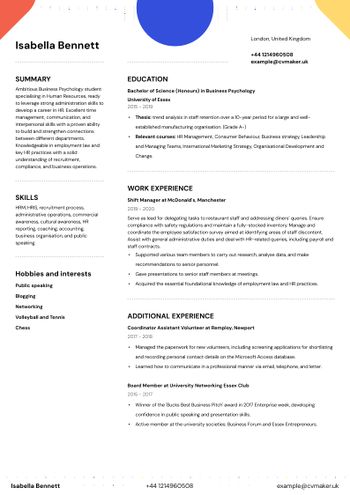A job offer is more than just the salary. The right employee benefits can make a real difference to your financial security, work-life balance and long-term wellbeing.
Whether you’ve just graduated, are re-entering the workforce or are looking to reach your next career goal, understanding what’s included in an employee benefits package can help you make smarter career choices.
This guide explains the most common employee benefits UK job seekers should know about, how to assess their true value and what to expect in different sectors.
In this article, we cover:
What are employee benefits?
Why employee benefits matter more than you think.
Key types of employee benefits to look out for.
Tips for discussing and negotiating benefits.
The Best CV Builder
Effortlessly create a professional CV
Easy to use on any device
Integrated spelling and grammar check
Customisable job-specific CV examples

What are employee benefits?
Employee benefits (also known as company perks or benefits for employees) are any forms of compensation provided by an employer that go beyond your base salary. They’re designed to reward employees, attract top talent and support wellbeing.
In the UK, benefits can include financial perks such as pensions or bonuses, as well as social, health and lifestyle advantages that enhance work-life balance.
Common employee benefits examples include:
Paid holiday and sick leave
Health and dental insurance
Pension contributions
Flexible working arrangements
Professional development budgets
Travel or meal allowances
Wellness and lifestyle perks
Development and training opportunities.
These benefits vary widely between employers and industries, so it’s worth looking closely at what’s included in each employee benefits package before accepting a job offer.
In the UK, some benefits are statutory (required by law), such as paid holiday and parental leave. Others are discretionary, meaning the employer chooses to offer them as part of their reward strategy.
Why employee benefits matter more than you think
Salary may get your attention, but benefits often determine how comfortable and supported you’ll feel in a role over time.
Strong benefits can:
Protect your income during illness or family leave
Reduce financial pressure through pensions, bonuses or discounts
Improve your quality of life with flexible hours or wellbeing schemes
Help you grow through paid learning or skill development
Increase job satisfaction and retention.
In other words, benefits reflect how much a company values its people. Firms offering well-rounded perks tend to have happier, more engaged employees.
Key types of employee benefits to look out for
While every company is different, most UK employers structure their employee benefits packages around four main types: financial, health, lifestyle and development benefits.
1. Financial benefits
These are the rewards that directly improve your financial security.
Typical examples include:
Pension contributions: Employers often match or exceed your own payments into a workplace pension.
Bonuses or profit sharing: Common in sales and corporate roles, rewarding high performance.
Stock options or promotions: Especially common when working for a startup or in tech jobs, once a certain milestone is reached.
Life insurance: Pays a lump sum to your family if you die while employed.
Income protection: Covers part of your salary if you’re unable to work due to illness.
Cost of living adjustment (COLA): Some employers offer a non-performance-based guarantee that they will keep pay in line with or above the rate of inflation.
These can make a big difference to your long-term stability, especially if you’re comparing average salaries or weighing up offers from companies with similar remuneration.
2. Health and well-being benefits
Many in-demand jobs being advertised across influential UK industries now go beyond statutory sick pay to support mental and physical health. These benefits have become increasingly common since the pandemic, as companies recognise that healthy employees are happier and more productive.
These often include:
Private healthcare or dental insurance
Mental health support (e.g. counselling or wellbeing apps)
Gym memberships or wellness allowances
Employee Assistance Programmes (EAPs) offering confidential advice.
3. Work-life balance and lifestyle perks
Another impact of the 2020 pandemic is the increase in flexible working arrangements. Many employees now see this as a standard feature of their employment. Working remotely has become one of the most valued employee benefits of recent years.
Examples include:
Hybrid or remote work options
Flexible hours or compressed weeks
Extra annual leave or “duvet days”
Sabbaticals or career breaks
Childcare vouchers or parental support.
These benefits can help you fit work around your life and not the other way around. If flexibility is a top priority, our article on hybrid working outlines what to expect and how to find employers who truly support it.
4. Learning and development
Employers increasingly see training as part of their benefits offering. It’s one of the clearest signs that a company invests in its people rather than just the job they do. Development benefits go beyond simple onboarding and contribute to long-term career growth, transferable skills and confidence.
This includes:
Funded professional qualifications or certifications: Support for courses in management, digital skills or specialist areas relevant to your field.
Access to online learning platforms: Many companies partner with providers such as LinkedIn Learning or Coursera, giving employees free access to thousands of courses.
Time off for study or exams: Especially valuable for those pursuing chartered or regulated professions.
Mentorship programmes and coaching: Opportunities to learn from senior colleagues and develop leadership or communication skills.
Clear career progression frameworks: Transparent pathways to promotion or pay increases tied to learning milestones.
Supporting women in the workplace
Workplaces are becoming more inclusive, and many employers are stepping up to offer benefits that truly support women’s unique needs. These perks not only enhance well-being but also create a more balanced and empowering environment for women to thrive.
Here are some examples:
Menstrual health support: Flexible leave policies, free access to sanitary products, and understanding workplaces that accommodate difficult days.
Menopause support: Thoughtful benefits like temperature-controlled spaces, access to specialist healthcare, and flexible working options to help manage symptoms.
Family-friendly perks: Enhanced maternity leave, childcare vouchers, and breastfeeding-friendly facilities to make balancing work and family life easier.
Growth opportunities for women: Mentorship programs, leadership training, and initiatives to close the gender pay gap, ensuring women have equal opportunities to succeed.
By offering these benefits, companies show they value and support women at every stage of their careers and lives.
Tips for discussing and negotiating benefits
When you receive a job offer, it’s natural to want to negotiate the salary. But benefits should not be overlooked and can often be flexible too.
Here’s how to approach the topic confidently and professionally:
Ask early but tactfully: Once an offer is made, it’s appropriate to ask for a full breakdown of the benefits. Over-emphasising benefits is what not to do in an interview.
Compare total compensation: Consider the full package including salary, pension, time off, insurance and perks.
Prioritise what matters: Decide which benefits genuinely impact your life (e.g. flexibility, childcare, training).
Negotiate politely: You can ask about alternatives such as remote work or higher pension contributions if the salary is fixed.
Get everything in writing: Confirm any agreed benefits in your offer letter or contract.
Essentials to consider for employee benefits
When comparing benefits between employers, think practically about what’s most valuable to you, not just what sounds impressive on paper.
Here are five essentials to keep in mind:
Pension scheme: Check contribution levels and whether the company uses a defined contribution or defined benefit scheme.
Holiday entitlement: The UK legal minimum is 28 days. However, it is up to the employer if they include unpaid public holidays within these days.
Family leave: Maternity, paternity, adoption and shared parental leave policies can differ. Legally, parents can share up to 52 weeks of leave, with pay depending on company policy. Learn more about maternity leave in the UK.
Health cover: If private healthcare is included, check what’s covered and whether dependants are included.
Flexibility: Look for hybrid options, part-time pathways or other signs of a supportive work culture.
Tip
Remember, benefits are an essential part of work-life balance. You need to be happy in your workplace to be productive. Considering a career change or job hopping to find the perfect match is no longer the taboo it once was.
Industry-specific benefits (NHS, Civil Service, Armed Forces)
Some public or government sector employers have structured, long-established benefits that go far beyond what private industry offers.
NHS employee benefits
NHS employee benefits are among the most comprehensive in the UK public sector. They include:
Pension contributions through the NHS Pension Scheme, one of the most generous in the UK, with up to 14.5% employer contribution.
Up to 41 days’ annual leave, including bank holidays for long-serving staff.
Enhanced sick pay that increases with service, starting at one month full pay and two months half pay after five years.
Career progression and funded training through clear pay bands and development pathways.
Maternity and paternity pay above the statutory minimum.
Access to employee discounts and the Blue Light Card for retail, travel and leisure.
If you are interested in a career in the Health Service, check out our article on the NHS selection process.
Civil Service employee benefits
Civil Service employee benefits focus on stability, flexibility and career growth. The career of a Civil Servant is well standardised, and the typical perks just as predictable:
A defined benefit pension with employer contributions averaging 27%, one of the strongest schemes in the UK.
25 days’ annual leave, rising by one day per year of service up to 30, plus public holidays.
Flexible working and job-sharing options across many departments.
Learning and development programmes for every grade.
Cycle-to-work and season ticket loan schemes.
Civil Service roles often prioritise internal mobility and structured training, making them ideal for those seeking long-term career development. For details on how hiring works, see our article on the Civil Service selection process.
Armed Forces benefits
The Armed Forces provide unique benefits designed for both service life and the transition to civilian careers. Key features include:
A non-contributory pension scheme under the Armed Forces Pension Scheme (AFPS 15).
Subsidised accommodation and relocation support.
Free medical and dental care for serving personnel.
Education and resettlement training for those leaving the service.
Adventure training and travel opportunities across the world.
Additional allowances for deployment, travel, and hardship.
These benefits recognise the demands of military life and ensure that service members and their families are supported both during and after active duty.
Key takeaways
Employee benefits are a crucial part of any job offer, often adding significant value beyond salary.
Always consider total compensation, not just pay.
Benefits can improve well-being, work-life balance, and long-term financial health.
The NHS, Civil Service, and Armed Forces offer some of the most comprehensive benefits in the UK.
Don’t hesitate to discuss or negotiate benefits that matter most to you.
Next steps?
Polish your job search toolkit with our intuitive AI CV maker, offering 20+ professional CV templates to help you create a professional CV effortlessly. To complement your CV, explore our range of expertly-designed cover letter templates. For more guidance, visit our career blog. Discover practical advice on tracking job applications efficiently, fine-tuning your CV and making a strong impression on potential employers. Take the next step with confidence and set yourself apart in the job market.
FAQs
Is a job offer more than just salary?
Yes. Salary is only one part of total compensation. Benefits such as pensions, flexible hours and healthcare can add substantial long-term value.
Do employee benefits include salary?
No. Employee benefits are additional to your pay, though together they make up your full reward package.
What are the benefits of employee wellness programmes?
Wellness programmes support physical and mental health, reduce burnout and can improve productivity and job satisfaction.
What are standard employee benefits?
In the UK, common benefits include pensions, paid holidays, sick pay and flexible working options. Many employers also offer health cover and discounts.
What are the 4 major types of employee benefits?
The main categories are:
Health and well-being benefits
Financial and pension benefits
Work-life balance and leave benefits
Professional development benefits
)



)

)